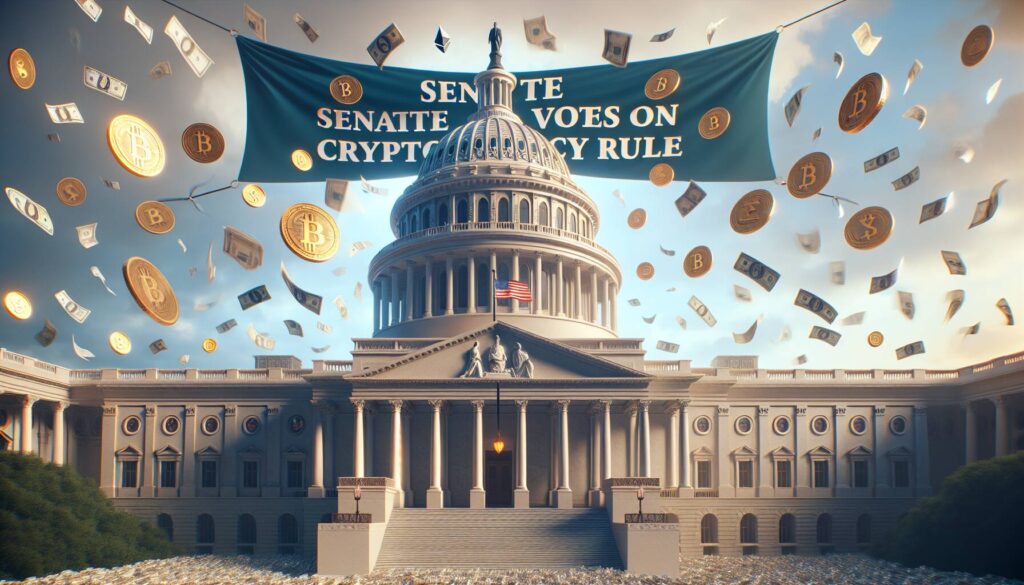The U.S. Senate is gearing up for a crucial vote this week aimed at dismantling a contentious Internal Revenue Service (IRS) rule that the cryptocurrency community has described as a significant threat to decentralized finance (DeFi). This situation stems from a December rule by the IRS requiring a broader range of brokers—now encompassing various crypto DeFi projects—to disclose specific tax information. In a bid to combat this regulation, some senators are leveraging the Congressional Review Act (CRA) to reverse these rules and ease perceived regulatory burdens.
“The Biden administration did everything it could to stifle financial innovation in the United States,” stated Senate Majority Leader John Thune, underscoring the urgency behind the proposed resolutions.
Senator Ted Cruz is leading the charge with a CRA resolution focused on the IRS rule, while Senator Pete Ricketts is doing the same for a related regulation from the Consumer Financial Protection Bureau (CFPB) concerning digital payment applications. Both initiatives are set for action in the Senate this week, with momentum building in the House Financial Services Committee as well, which has already forwarded a matching resolution to the House floor.
The urgency of these actions stems from the regulatory timeline dictated by the CRA, which mandates that reversals occur within specific legislative periods following a regulation’s approval. This approach echoes similar tactics seen during President Donald Trump’s administration, aiming to roll back previous regulatory frameworks.
“This week Congress will vote on my resolution to rescind that regulation. I’m confident we will,” expressed Cruz, emphasizing the importance of protecting American innovation.
In addition to the IRS rule, the CFPB’s impending regulation looks to impose stricter oversight on major technology firms that manage digital wallets and payment applications. Critics, including Senator Ricketts, assert that this “one-size-fits-all solution” could hinder innovation and impose unnecessary restrictions on companies actively revolutionizing digital finance.
Amidst this unfolding regulatory saga, the White House has plans for a crypto summit scheduled for March 7, intended to bring together key innovators and regulators in the cryptocurrency space, signaling a potential pivot in the national dialogue surrounding digital assets.

Impact of IRS and CFPB Regulatory Changes on Crypto and DeFi
The upcoming vote in the U.S. Senate regarding the reversal of IRS and CFPB rules is poised to impact the cryptocurrency and decentralized finance (DeFi) sectors significantly. Below are the key points to consider:
- IRS Rule Controversy:
- The IRS proposed regulations requiring more brokers to disclose tax information, which crypto advocates see as a threat to DeFi.
- Senator Ted Cruz is leading efforts to repeal this rule through the Congressional Review Act (CRA).
- CFPB Regulation Concerns:
- The CFPB’s new rule aims to regulate tech companies providing digital wallets and payment apps similarly to large banks.
- Senator Pete Ricketts supports the repeal of this regulation, arguing it stifles innovation.
- Legislative Process:
- Reversals of federal agency rules require swift legislative action due to deadlines imposed by the CRA.
- The House Financial Services Committee is advancing a matching IRS resolution, signaling bipartisan concerns over these regulations.
- Possible Economic Implications:
- Reversal of these regulations could support financial innovation and keep digital asset companies operating within the U.S.
- This could lead to job creation and growth in the tech and finance sectors, impacting economic stability.
- Political Context:
- These legislative actions reflect broader tensions between the Biden administration and Republican lawmakers regarding financial regulation and consumer protection.
- The context of pre-election maneuvering for regulatory rollback further highlights the ongoing political discourse surrounding crypto regulations.
“The Senate is working to undo these burdensome regulations one at a time to restore financial freedom for the American people.” – John Thune
Senate Moves to Repeal IRS DeFi Tax Rule: An Impactful Shift in Cryptocurrency Regulation
The U.S. Senate is stepping into the spotlight this week as it prepares to vote on repealing a controversial IRS rule that has drawn ire from the cryptocurrency community. The proposed repeal, backed by prominent Republican senators, targets regulations seen as detrimental to decentralized finance (DeFi) innovation. This legislative move comes at a time when similar initiatives are gaining traction worldwide, reflecting a broader trend of governments re-evaluating financial regulations to foster innovation in the rapidly evolving digital currency landscape.
Competitive Advantages: By potentially overturning this IRS rule, the Senate is positioning itself as a champion for financial innovation, particularly in the crypto sector. The support from key figures like Senator Ted Cruz indicates a strong commitment to preserving the freedoms of decentralized finance, appealing to both innovators and investors who are looking for regulatory clarity and a supportive environment for growth. Furthermore, this action aligns with a global shift where other countries are embracing cryptocurrencies, thereby making the U.S. more competitive in an international market that is increasingly favoring favorable regulations.
Disadvantages for Traditional Financial Entities: However, this push to deregulate may not sit well with all sectors. Financial institutions that have already adapted to existing regulatory frameworks might face challenges as a less regulated crypto environment could lead to an uneven playing field. Additionally, there are concerns regarding consumer protection and the potential for fraud in a more liberal regulatory climate. Senators like Pete Ricketts argue that easing regulations on digital payments could inadvertently create risks for consumers and expose them to a range of financial vulnerabilities.
Stakeholders Affected: The implications of this vote are far-reaching. Startups and established companies in the crypto space stand to benefit from a reduction in regulatory burdens, which may encourage domestic innovation and investment. Conversely, traditional banks and financial institutions may view these changes as a threat to their regulatory compliance obligations, potentially leading to a rift in the financial landscape. Consumers, too, could find themselves caught in the crossfire — while they might gain access to more innovative financial products, they could also encounter increased risks associated with an under-regulated environment.
Future Prospects: As the Senate prepares to act, the stakes have never been higher for the future of cryptocurrency regulation in the U.S. The upcoming crypto summit planned by the White House could serve as a platform for discussion among industry leaders and regulators, helping to shape a more conducive regulatory framework. However, the outcomes depend on bipartisan support and the willingness to balance innovation with consumer protection, making this a pivotal moment for all stakeholders involved.

















